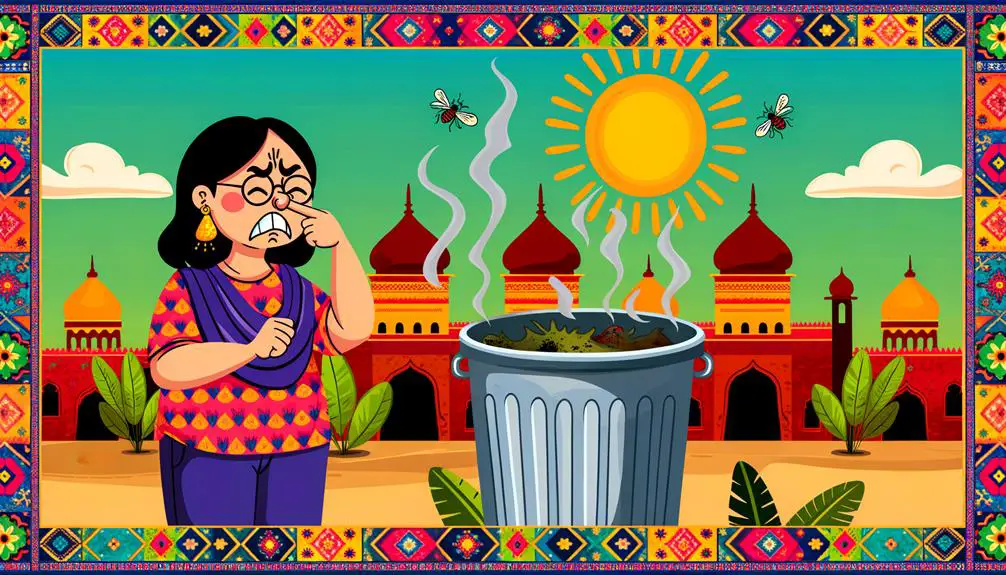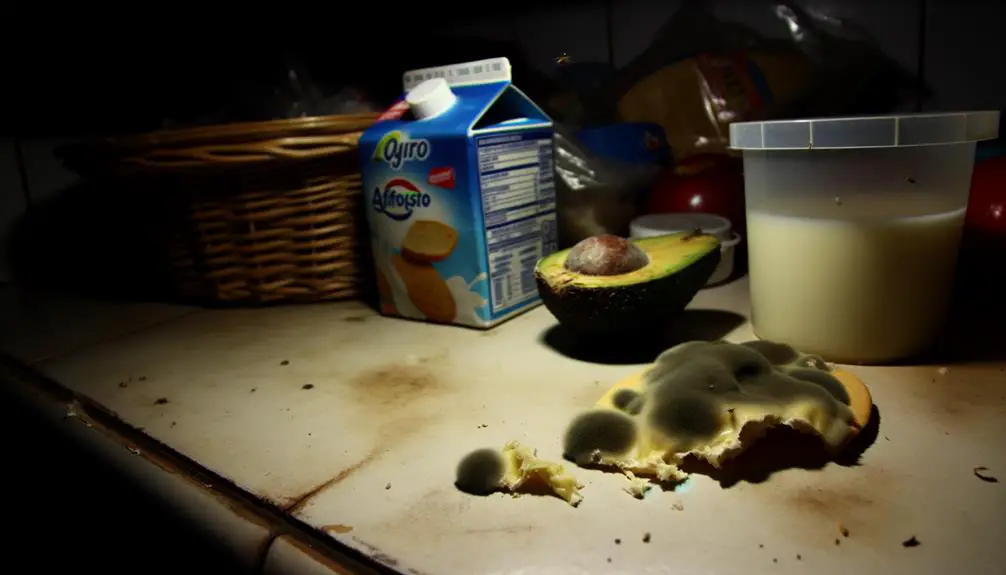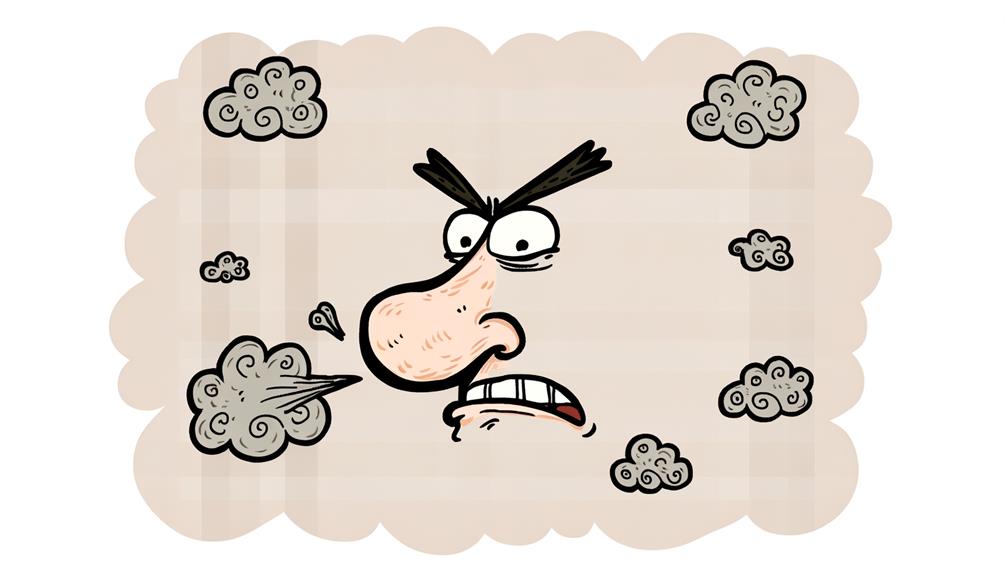When communicating in Spanish, you'll frequently encounter informal expressions that convey disgust, revulsion, or strong aversion to unpleasant odors. You might hear "Esto huele a rayos" to convey strong aversion or "Qué peste!" to exclaim about a stench. To describe a stinky place, you might say "Calles puercas" for stinky alleys or "Basurero apestoso" for a stinky dumpster. Explore colloquialisms like "oler mal" for unpleasant body odor, "guarro" for being dirty or unkempt, and more. Continue exploring to uncover the nuances of Spanish slang for stinky situations.
Expressing Disgust With Smells

When you encounter a foul odor in Spain, you can express your disgust with a range of slang expressions that convey your strong aversion to the smell. Smell aversion is a common phenomenon, and the Spanish language has a variety of words and phrases to describe the intensity of odor sensitivity.
For instance, you can say 'esto huele a rayos' (this smells to high heaven) or 'me da asco' (this disgusts me) to convey your distaste. If the smell is particularly pungent, you can exclaim 'qué peste!' (what a stench!) or 'huele a podrido' (it smells rotten).
When describing the source of the smell, you can use phrases like 'este lugar huele mal' (this place smells bad) or 'hay un olor raro aquí' (there's a weird smell here). Your smell aversion can also be expressed through facial expressions and body language, such as pinching your nose or taking a step back.
Stinky Places and Things
Encountering foul-smelling locations and objects is an unfortunate reality, and in Spain, you can describe these stinky places and things using a range of slang expressions.
As you navigate through Spanish cities, you might stumble upon stinky alleys, known as 'calles puercas' or 'callejones apestosos.' These narrow passageways can be breeding grounds for unpleasant odors, making it essential to have the right vocabulary to express your disgust.
When visiting public restrooms, you might be greeted by a 'servicio sucio' or a 'baño asqueroso' – a foul restroom that's an assault on your senses. In these situations, you can use slang terms like 'pedo' or 'asqueroso' to describe the overwhelming stench.
Additionally, you might come across a 'basurero apestoso' – a stinky dumpster or trash can that's an eyesore and a nose-curler. By incorporating these expressions into your vocabulary, you'll be better equipped to describe the unpleasant realities of everyday life in Spain.
Food That's Gone Bad

Your Spanish friends might warn you about that suspicious-smelling 'tortilla' that's been left out too long, describing it as 'pésima' or 'asquerosa' – a rotten or disgusting dish that's better avoided. They're right to caution you; spoiled leftovers can be a breeding ground for bacteria, making you sick if consumed.
In Spanish slang, rotten groceries or spoiled food are referred to as 'pérdida' or 'echada a perder', literally meaning 'lost' or 'gone bad'. When shopping, be mindful of expired or damaged products, as they can quickly turn into 'basura' (garbage).
If you're unsure whether a food item is still good, trust your instincts and err on the side of caution. Remember, it's always better to be safe than sorry when it comes to consuming food that's gone bad.
Smelly People and Pets
In Spanish slang, you'll also encounter words that describe people or pets with unpleasant body odor, a condition known as 'oler mal' or 'tener mal olor'. These phrases are often used to emphasize the importance of personal hygiene and pet grooming.
When you neglect your personal hygiene, you might be called a 'guarro' or 'asalvajado', implying that you're dirty or unkempt. Similarly, if your pet smells bad due to lack of grooming, you might be teased about having a 'perro guarro' or a dirty dog.
In Spanish-speaking cultures, personal hygiene and pet grooming are considered essential aspects of daily life. You're expected to maintain good hygiene practices, such as showering regularly and using deodorant, to avoid being labeled as 'maloliente' or smelly.
Similarly, regular pet grooming is necessary to prevent unpleasant odors. By prioritizing personal hygiene and pet grooming, you can avoid being associated with these negative terms and maintain a positive image in social circles.
Describing Bad Odors

When you're around someone or something that reeks, you'll likely hear Spanish speakers describing the bad odor using vivid and descriptive slang terms. These terms often evoke a strong sense of the odor's intensity, characteristics, and even the emotions it evokes.
In Spanish slang, you'll encounter a rich scent vocab that helps speakers distinguish between different odor profiles. For instance, 'apestar' describes a strong, pungent smell, often associated with sweat or body odor. On the other hand, 'heder' is used to describe a faint, unpleasant smell, often reminiscent of something rotten.
You might also hear 'olía a' followed by a descriptive phrase, which literally means 'it smells like' and is used to convey the specific characteristics of the odor. By using these slang terms, Spanish speakers can effectively convey the nuances of an unpleasant smell, creating a shared understanding of the offending odor.
Idiomatic Expressions for Stench
You'll often hear Spanish speakers using idiomatic expressions to convey the intensity or characteristics of a stench, such as 'huele a pies' (it smells like feet) or 'huele a chamuco' (it smells like a skunk), which vividly evoke the unpleasantness of the odor. These expressions are deeply rooted in Spanish olfactory culture, where scent euphemisms are used to describe unpleasant smells without directly referencing their source.
| Expression | Meaning | Intensity Level |
|---|---|---|
| Huele a perro mojado | Smells like a wet dog | 6/10 |
| Huele a cuarto de baño | Smells like a bathroom | 8/10 |
| Huele a basura | Smells like trash | 9/10 |
| Huele a sudor | Smells like sweat | 5/10 |
| Huele a humedad | Smells like dampness | 7/10 |
These idiomatic expressions not only add flavor to everyday conversations but also highlight the significance of smell in Spanish culture. By using these expressions, you'll be able to navigate everyday situations with ease and precision, even when dealing with unpleasant odors.
Insults and Teasing With Smell

They use smell-based insults to tease friends and acquaintances in a lighthearted way, often employing clever wordplay and witty comparisons to create humorous effects. You'll find that these olfactory jokes and smell pranks are an integral part of Spanish slang, allowing individuals to poke fun at each other without causing offense.
These verbal exchanges are often playful and informal, used to build camaraderie and strengthen social bonds.
When engaging in smell-based teasing, you'll notice that speakers frequently employ metaphors and hyperbole to exaggerate the severity of a person's odor. For instance, someone might be jokingly referred to as 'pepe el pedo' (Joe the Fart), implying that their flatulence is notorious. Alternatively, a friend might be teased about having 'un aliento de camión' (breath like a truck), suggesting that their morning breath could knock someone over.
These lighthearted insults are an essential component of Spanish slang, allowing individuals to engage in playful banter and reinforce social connections.
Frequently Asked Questions
Can I Use Smell-Related Insults With Friends in Spain?
You might think that using smell-related insults with friends in Spain is a harmless joke, but you'd be wrong. In reality, you're walking a fine line between friendly teasing and offending cultural boundaries.
While playful banter is common in Spain, references to body odor can be particularly sensitive. Be cautious and consider your friends' comfort levels before making jokes that might be misinterpreted or taken personally.
Are There Regional Differences in Smell-Related Slang?
When exploring regional differences in slang, you'll find dialectical variations across Spain. Regional nuances shape the way locals use smell-related insults.
In Andalusia, phrases like 'huele a' (smells like) are common, while in Catalonia, 'fa pudor' (stinks) is preferred.
Even within regions, urban vs. rural areas may employ distinct expressions. You'll need to familiarize yourself with local dialects to effectively use smell-related slang with friends in different parts of Spain.
Can Smell Be Used to Describe Emotional States in Spanish?
You might be surprised to learn that 75% of emotions are triggered by smells.
When it comes to describing emotional states in Spanish, you'll find that smell plays a significant role. Olfactory emotions, such as feeling 'sour' (agrio) or 'bitter' (amargo), are common expressions.
Scent metaphors, like 'smelling a rat' (olerse algo raro), are also used to convey suspicions or doubts.
Are There Any Smell-Related Idioms in Latin American Spanish?
You'll find that Latin American Spanish is rich in olfactory expressions that add flavor to daily conversations.
When exploring smell-related idioms, you'll come across scented phrases like 'olor a' (to smell like) used to describe something or someone reminiscent of a particular characteristic.
For instance, 'olor a peligro' means to smell danger, implying a sense of warning or threat.
These expressions add a nuanced layer to your language, allowing you to convey complex emotions and ideas with precision.
Can I Use Smell-Related Words in Formal Writing in Spanish?
When writing formally in Spanish, you'll want to opt for scent-related words that convey nuance. Instead of relying on casual expressions, choose formal equivalents that precision-craft your message.
For instance, use 'aroma' instead of 'olor' to evoke a more refined sense of smell. By selecting words that convey subtle differences in scent, you'll imbue your writing with sophistication and precision, making your message more impactful in formal contexts.







